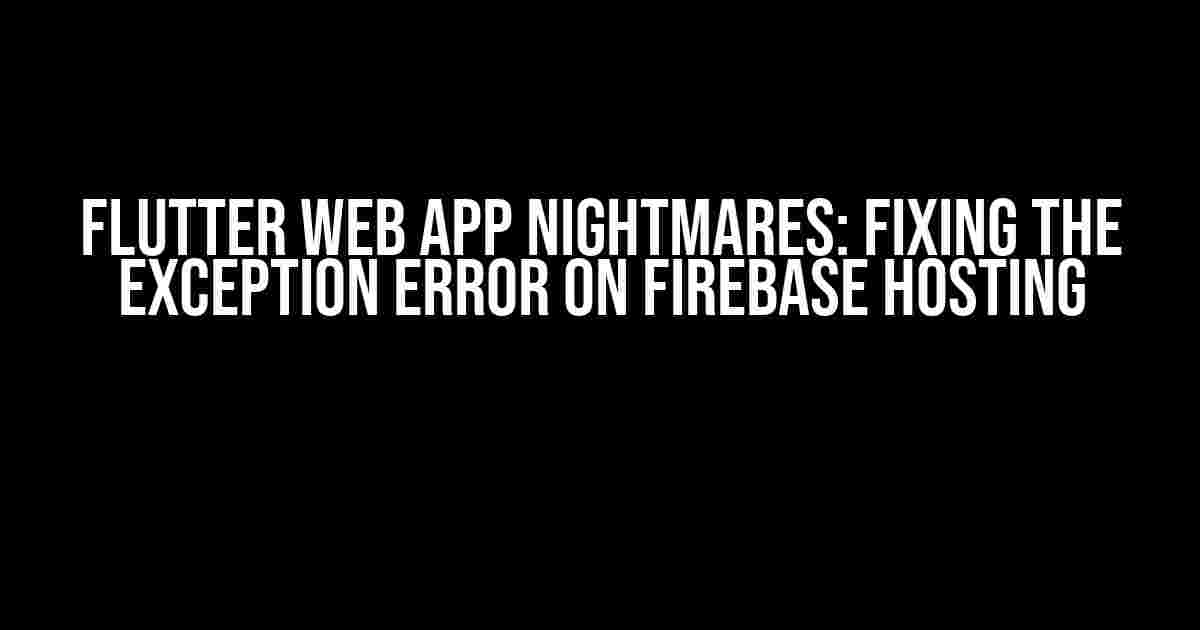Are you a Flutter developer who’s thrilled to deploy your web app to Firebase Hosting, only to be greeted by a frustrating exception error? You’re not alone! Many devs have faced this issue, and it’s more common than you think. In this article, we’ll dive into the world of Flutter web app deployment and explore the possible causes and solutions to this pesky error.
The Exception Error: A Closer Look
Before we start troubleshooting, let’s take a closer look at the exception error itself. When you deploy your Flutter web app to Firebase Hosting, you might encounter an error message like this:
Exception: Firebase Hosting did not provide a valid deployment URL
This error can occur due to various reasons, including misconfigured Firebase projects, incorrect deployment settings, or even issues with the Flutter framework itself. But don’t worry, we’ll cover all the possible causes and provide step-by-step solutions to get your app up and running smoothly.
Step 1: Verify Your Firebase Project Configuration
The first step in troubleshooting the exception error is to ensure your Firebase project is configured correctly. Follow these steps to verify your project setup:
-
In your Firebase console, navigate to the “General” tab and check if your project is correctly linked to your Google Cloud account.
-
Next, go to the “Hosting” tab and ensure that you’ve set up your hosting configuration correctly. You should see a “Deploy to Firebase Hosting” button.
-
Verify that your Firebase project ID and API key are correctly configured in your Flutter project. You can do this by checking your
google-services.jsonfile.
If you’ve double-checked your Firebase project configuration and everything looks good, let’s move on to the next step.
Step 2: Check Your Flutter Project Settings
In this step, we’ll focus on your Flutter project settings. Here are some potential issues to look out for:
-
Incorrectly configured
firebase_hosting.jsonfile: Make sure this file is correctly formatted and contains the necessary configuration settings. -
Missing or incorrect
pubspec.yamlfile: Ensure that yourpubspec.yamlfile contains the necessary dependencies and configurations for Firebase Hosting. -
Inconsistent Flutter and Firebase versions: Ensure that your Flutter and Firebase versions are compatible and up-to-date.
To fix these issues, follow these steps:
-
Open your
firebase_hosting.jsonfile and verify that it contains the correct configuration settings. Here’s an example:{ "hosting": { "public": "build/web", "ignore": ["firebase.json", "**/.*"], "rewrites": [ { "source": "**", "destination": "/index.html" } ] } } -
Check your
pubspec.yamlfile and ensure that it contains the necessary dependencies and configurations for Firebase Hosting. Here’s an example:dependencies: flutter: sdk: flutter flutter_web_plugins: sdk: flutter firebase_core: "^1.10.0" firebase_hosting: "^0.4.0" -
Run
flutter pub getto ensure that your dependencies are up-to-date. Then, runflutter doctor -vto verify that your Flutter installation is correct.
If you’ve double-checked your Flutter project settings and everything looks good, let’s move on to the next step.
Step 3: Configure Your Firebase Hosting Settings
In this step, we’ll focus on configuring your Firebase Hosting settings. Here are some potential issues to look out for:
-
Incorrectly configured
firebase.jsonfile: Make sure this file contains the correct configuration settings for your Firebase Hosting project. -
Missing or incorrect
index.htmlfile: Ensure that yourindex.htmlfile is correctly configured and points to the correct deployment URL. -
Inconsistent Firebase Hosting and Firebase Realtime Database configurations: Ensure that your Firebase Hosting and Firebase Realtime Database configurations are compatible and correctly configured.
To fix these issues, follow these steps:
-
Open your
firebase.jsonfile and verify that it contains the correct configuration settings. Here’s an example:{ "hosting": { "site": "your-app-id", "public": "public", "rewrites": [ { "source": "**", "destination": "/index.html" } ] } } -
Check your
index.htmlfile and ensure that it’s correctly configured and points to the correct deployment URL. Here’s an example:<!DOCTYPE html> <html> <head> <title>Your App Title</title> </head> <body> <div id="root"></div> <script> import 'package:flutter_web_plugins/flutter_web_plugins.dart'; main(); </script> </body> </html> -
Run
firebase deploy --only hostingto redeploy your app to Firebase Hosting. This will ensure that your Firebase Hosting settings are correctly configured.
Step 4: Verify Your Deployment URL
In this final step, we’ll verify that your deployment URL is correctly configured. Here are some potential issues to look out for:
-
Incorrectly configured deployment URL: Ensure that your deployment URL is correctly configured and points to the correct Firebase Hosting project.
-
Missing or incorrect
firebaseConfigvariable: Ensure that yourfirebaseConfigvariable is correctly configured and points to the correct Firebase project.
To fix these issues, follow these steps:
-
Open your
main.dartfile and verify that your deployment URL is correctly configured. Here’s an example:import 'package:firebase_core/firebase_core.dart'; Future<void> main() async { WidgetsFlutterBinding.ensureInitialized(); await Firebase.initializeApp(); await Firebase.instance.hosting().setUrl('https://your-app-id.firebaseapp.com'); runApp(MyApp()); } -
Verify that your
firebaseConfigvariable is correctly configured and points to the correct Firebase project. Here’s an example:final FirebaseOptions _options = const FirebaseOptions( apiKey: 'YOUR_API_KEY', appId: 'YOUR_APP_ID', projectId: 'YOUR_PROJECT_ID', messagingSenderId: 'YOUR_MESSAGING_SENDER_ID', );
By following these steps, you should be able to fix the exception error and deploy your Flutter web app successfully to Firebase Hosting. Remember to double-check your project configuration, Flutter project settings, Firebase Hosting settings, and deployment URL to ensure that everything is correctly configured.
Conclusion
Deploying a Flutter web app to Firebase Hosting can be a complex process, but with the right troubleshooting steps, you can fix the exception error and get your app up and running smoothly. By following the steps outlined in this article, you’ll be able to identify and fix common issues that can cause the exception error, including misconfigured Firebase projects, incorrect deployment settings, and issues with the Flutter framework. Remember to stay calm, be patient, and follow the steps carefully to ensure a successful deployment.
| Common Issues | Solutions |
|---|---|
| Misconfigured Firebase project | Verify Firebase project configuration, check Firebase console, and ensure correct project ID and API key |
| Incorrectly configured Flutter project settings | Check firebase_hosting.json file, pubspec.yaml file, and Flutter installation |
| Incorrectly configured Firebase Hosting settings | Check firebase.json file, index.html file, and Firebase Hosting configuration |
| Incorrectly configured deployment URL |


